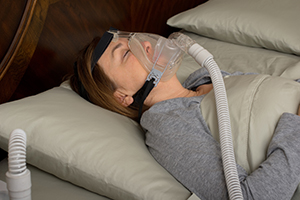 Sleep apnea is becoming one of the most worrisome condition for health advocates. It’s been linked too many diseases to list here and cripples the life of sufferers.
Sleep apnea is becoming one of the most worrisome condition for health advocates. It’s been linked too many diseases to list here and cripples the life of sufferers.
But nobody was ready for what a new study published in the journal Sleep revealed.
Apparently, one of the effects of sleep apnea is to prevent you from doing the one thing you need to do to combat the disease.
Fortunately, there is a way around this.
The researchers wanted to find out whether the bodies of sleep apnea sufferers were less capable of physical exercise than those of good sleepers were. To be more precise, can their hearts and lungs handle the same amount of exercise as those of good sleepers can?
They surveyed already existing literature on the subject and identified 45 studies with 5,379 subjects that met sufficiently strict scientific study criteria.
They firstly discovered that people without sleep apnea could use 3.096 milliliters per kilogram of body weight per minute more oxygen than those with sleep apnea.
If your body can consume a lot of oxygen during exercise, you are healthy and don’t strain your body beyond safe limits during exercise.
But if you cannot get enough oxygen around your body while exercising, your ability to exercise productively will be impaired, and you will have to strain unacceptably hard to get your exercise done.
And whereas healthy people’s oxygen consumption increases over time as they workout, the same thing doesn’t happen for those suffering sleep apneas.
Moreover, people without sleep apnea had a maximal heart rate 8.423 beats per minute higher than those without sleep apnea, meaning that their cardiovascular systems could handle a faster heart rate during exercise than those of sleep apnea sufferers could.
This is especially worrisome since sleep apnea is very often caused by being overweight. And to lose weight, we need to exercise, which, according to this study, people with sleep apnea have very difficult time with.

 Overcoming IBD
Overcoming IBD Multiple Sclerosis
Multiple Sclerosis Banishing Bronchitis
Banishing Bronchitis Gum Disease Gone
Gum Disease Gone Overcoming Onychomycosis
Overcoming Onychomycosis Neuropathy No More
Neuropathy No More The Prostate Protocol
The Prostate Protocol Brain Booster
Brain Booster
 Ironbound
Ironbound
 Solution for Shingles
Solution for Shingles
 The Bone Density Solution
The Bone Density Solution
 The Ultimate Healing Protocol
The Ultimate Healing Protocol
 The Parkinson's Protocol
The Parkinson's Protocol
 The Chronic Kidney Disease Solution
The Chronic Kidney Disease Solution
 Overthrowing Anxiety
Overthrowing Anxiety The Fatty Liver Solution
The Fatty Liver Solution The Hypothyroidism Solution
The Hypothyroidism Solution
 The End of Gout
The End of Gout The Blood Pressure Program
The Blood Pressure Program
 The Oxigized Cholesterol Strategy
The Oxigized Cholesterol Strategy
 Stop Snoring And Sleep Apnea Program
Stop Snoring And Sleep Apnea Program
 The Arthritis Strategy
The Arthritis Strategy The Vertigo & Dizziness Program
The Vertigo & Dizziness Program The 3-Step Diabetes Strategy
The 3-Step Diabetes Strategy Hemorrhoids Healing Protocol
Hemorrhoids Healing Protocol The Erectile Dysfunction Master
The Erectile Dysfunction Master Weight Loss Breeze
Weight Loss Breeze The IBS Program
The IBS Program The Insomnia Program
The Insomnia Program The Migraine and Headache Program
The Migraine and Headache Program The Neck Pain Solution
The Neck Pain Solution The Menopause Solution
The Menopause Solution The Ejaculation Master
The Ejaculation Master The TMJ Solution
The TMJ Solution The Acid Reflux Solution
The Acid Reflux Solution The Fibromyalgia Solution
The Fibromyalgia Solution The Psoriasis Strategy
The Psoriasis Strategy